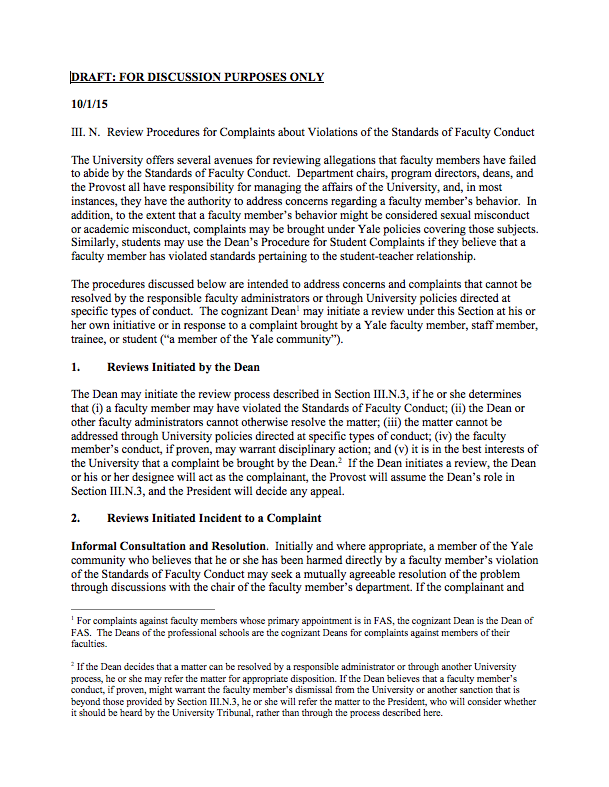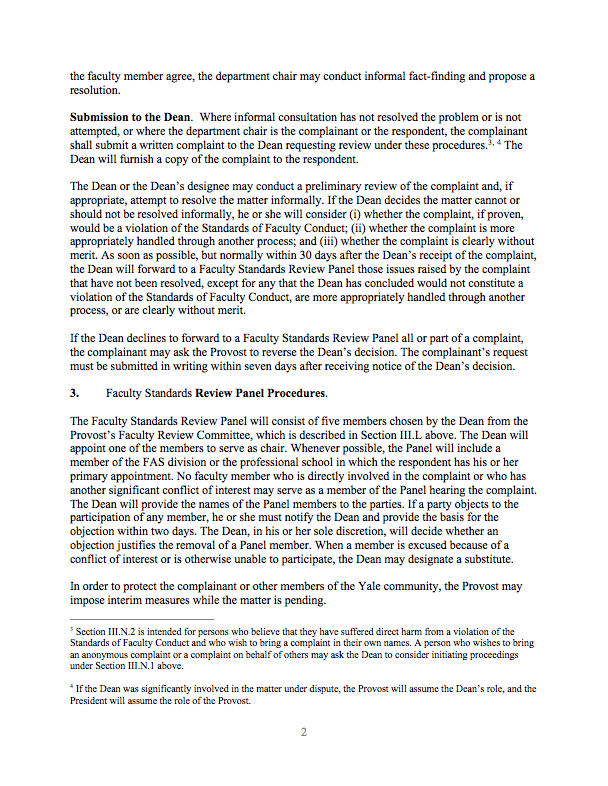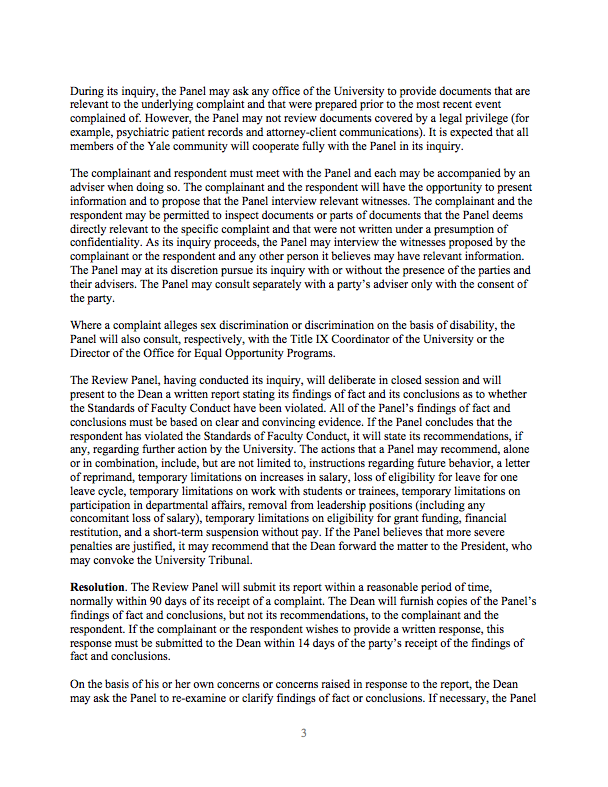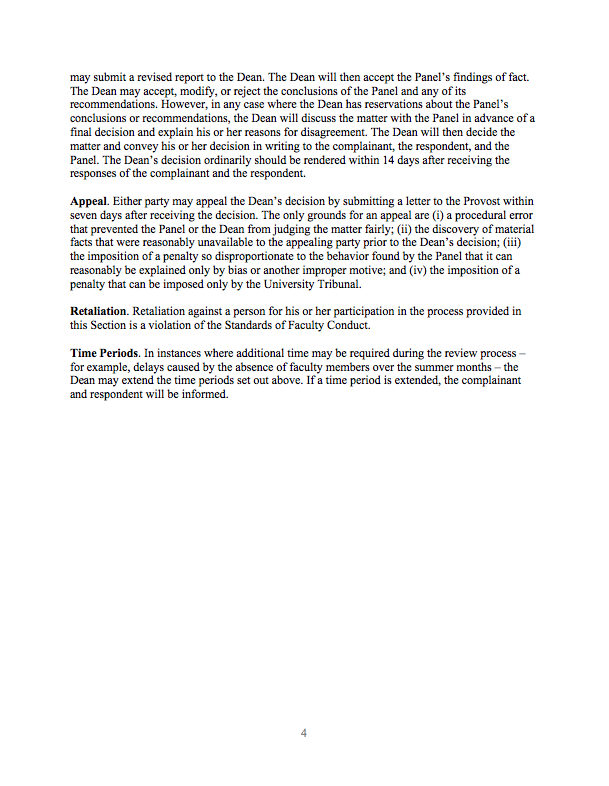Scroll down to view the draft of “Review Procedures for Complaints about Violations of the Standards of Faculty Conduct.”
The committee that produced the Standards of Faculty Conduct is now circulating a draft of “Review Procedures for Complaints about Violations of the Standards of Faculty Conduct” to invite discussion. These Procedures merit exhaustive discussion, since they will bind every faculty member in all of Yale’s schools. I recently spoke before the Faculty of Arts and Sciences Senate to encourage that body to vote against the Procedures because they fail to provide for fair hearings for those of us who teach at Yale.
It is important to note that cases of faculty sexual misconduct or academic misconduct will continue be tried before the University-Wide Committee on Sexual Misconduct or under the current University procedures for academic misconduct. The new procedures outline the rules for hearings of faculty members who violate the Standards of Faculty Conduct recently incorporated in the Faculty Handbook.
Those standards are capacious enough to invite complaints against faculty for failing to hold office hours as scheduled, being late with a letter of recommendation, breaking a departmental rule, intimidating a colleague, shirking committee responsibilities or publicly demonstrating or speaking in a way that disrupts the “orderly conduct of a University function or activity.” Anyone connected with Yale — student, staff member, administrator or post-doctoral trainee — is allowed to file a complaint.
The Yale faculty overwhelmingly deplores bad conduct in its ranks and seeks to stop it when it occurs. However, it is equally important to provide a fair hearing for offenders.
Moreover, due process is equally crucial for an innocent faculty member unjustly accused. In addition, the system must recognize gradations of seriousness in a single offense; for example, missing office hours one week does not constitute a pattern of being unavailable to students. Moreover, the judicial apparatus must incorporate the principle of proportional punishment across the cases it hears.
The proposed Procedures lack any of those protections, yet a guilty finding can result in a “combination” of punishments, from a verbal warning to “short-term suspension without pay.” But the Panel may do more, since its actions “are not limited to” those listed. The outcome of such a hearing could ruin an innocent faculty member’s career here at Yale or his or her prospects at other institutions.
The Procedures violate basic constitutional rights to due process, including the active role of counsel at hearings, the accused’s right to hear and question witnesses, timely hearings, fair appeals, double jeopardy, equal justice and a jury chosen by a process untainted by bias.
Under the current Procedures, deans across the University, untrained in evidentiary standards and judicial fairness, may both initiate trials and ultimately judge them. Deans may bring complaints themselves and then overturn the Faculty Review Panel’s findings. The same deans appoint the Faculty Review Panel, which acts as prosecutor, judge and jury. The dean chooses the Panel from a pool appointed by the provost. If the accused faculty member objects to anyone on the panel, the dean may overrule the accused’s objection. The accused may have an “adviser,” but the adviser has no guaranteed right to speak.
The Panel, but not the accused, has a right to procure and review confidential University documents concerning the accused. The Panel may call witnesses. The accused may propose witnesses, but the Panel does not have an obligation to call them. The Panel decides on “clear and convincing evidence,” but has no training in evidentiary standards.
The Panel has the explicit right to exclude the accused from its examination of witnesses against the accused, who has no right to hear or read their testimony. There is no right to or provision for a written transcript of the proceedings. The entire trial may last three months, or even six months, if summer intervenes.
Upon receipt of the Panel’s findings, the dean may ask for more evidence, which again, the accused has no right to review. The dean may then overturn the Panel’s findings and/or punishment recommendations. There is no mechanism by which the accused can introduce evidence on the comparative past discipline of others similarly accused, propagating unequal punishment across the faculty.
The standards for appeal are so limited that no effective appeal is possible. They include “a procedural error” or “the discovery of material facts,” both impossible to prove without a transcript or allowing the accused to hear and question witnesses. Appeal can be made with proof of the imposition of a disproportionate penalty. However, no mechanism exists to introduce evidence that the penalty is disproportionate, since there is no right to discovery of the disposition of other cases or their penalties.
I urge faculty members in every school to become familiar with the as yet untested Standards of Faculty Conduct and to discuss and vote on the draft Procedures in their respective faculty meetings. There is still time to construct a fair system, one that incorporates the principles of due process and one that empowers the faculty to assume responsibility for holding itself to the highest standards.
Glenda Gilmore is the Peter V. and C. Vann Woodward Professor of History. Contact her at glenda.gilmore@yale.edu .











